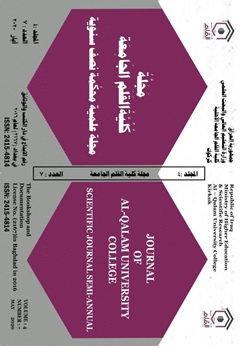Abstract
The current study aims to identify the effect of the cube strategy in developing the pivotal thinking skills of the fourth literary grade students in the subject of history. The study sample consisted of (56) students of the fourth literary grade in Hamrin High School within the day schools affiliated to the General Directorate of Education in Kirkuk Governorate. They were randomly distributed to two equal groups in a number of related variables, with (28) students in the experimental group, and (28) students in the control group. The experimental group was taught according to the cube strategy, and the control group was taught according to the usual method. To achieve the study objectives and hypothesis, the researcher prepared a test for the pivotal thinking skills that consisted of (26) objective paragraphs of the type of multiple choice, three alternatives, distributed over eight main skills and (11) sub-skills, and each paragraph measures a skill for pivotal thinking. The researcher also formulated a number of behavioral objectives, which amounted to (36) behavioral objectives according to the three levels (remembering, comprehension, and application) that he used in preparing the teaching plans and by (9) teaching plans for each group and according to the method used. The researcher verified the validity and reliability of the tool, and applied to the study sample, by using the appropriate statistical means. The results were analyzed that showed:There are statistically significant differences at the level (0.05) between the average development of pivotal thinking skills among the members of the two research groups according to the teaching method variable and in favor of the experimental. According to the results, the researcher concluded that the adoption of the cube strategy has been successful and effective in teaching history for the fourth literary grade. He also recommended attention to diversity in modern strategies when teaching history because of its role in raising the level of achievement and developing thinking among students.
Keywords
cube
fourth literary
history.
pivotal thinking
strategy
Abstract
يهدف الدراسة الحالية إلى التعرف على (اثر استراتيجية المكعب في تنمية مهارات التفكير المحوري لدى طلاب الصف الرابع الأدبي في مادة التاريخ)تكونت عينة الدراسة من (56) طالباً من طلاب الصف الرابع الادبي في اعدادية حمرين للبنين ضمن المدارس النهارية التابعة إلى المديرية العامة لتربية محافظة كركوك، وقد وزعوا عشوائياً الى مجموعتين متكافئتين في عدد من المتغيرات ذوات العلاقة وبواقع (28) طالب في المجموعة التجريبية، و(28) طالب في المجموعة الضابطة، ودرَّس المجموعة التجريبية وفق استراتيجية المكعب، والمجموعة الضابطة بالطريقة الاعتيادية، ولتحقيق أهداف الدراسة وفرضيته، اعد الباحث اختباراً للمهارات التفكير المحوري تكونت من (26) فقرة موضوعية من نوع الاختيار من متعدد ثلاثي البدائل موزعاً على ثمان مهارة رئيسية و(11) مهارة فرعية وكل فقرة تقيس مهارة للتفكير المحوري، كما صاغ الباحث عدداً من الأغراض السلوكية والتي بلغت (36) هدفاً سلوكياً وفق المستويات الثلاث (التذكر، الاستيعاب، التطبيق) استخدمها في اعداد الخطط التدريسية وبواقع (9) خطة تدريسية لكل مجموعة وحسب الطريقة المستخدمة، وتحقق الباحث من صدق الأداة وثباته ومن ثم طبقت على عينة الدراسة، وباستخدام الوسائل الإحصائية المناسبة تم تحليل النتائج التي أظهرت: وجود فروق ذات دلالة احصائية عند مستوى (0.05) بين متوسط تنمية مهارات التفكير المحوري لدى افراد مجموعتي البحث تبعا لمتغير طريقة التدريس ولصالح التجريبية. وفي ضوء النتائج استنتج الباحث، إن اعتماد استراتيجية المكعب قد لقى نجاحاً وفاعلية في تدريس مادة التأريخ للصف الرابع الادبي، كما اوصى بالاهتمام بالتنوع في الاستراتيجيات الحديثة عند تدريس مادة التاريخ لما لها من دور في رفع مستوى التحصيل وتنمية التفكير لدى الطلاب.
Keywords
استراتيجية، المكعب، التفكير المحوري، الرابع الأدبي، التاريخ.
